Workflow
Errors
Handling errors in a distributed system is typically complex. Infinitic simplifies this by automatically tracking error chains and allowing you to handle errors directly within the workflow.
Types of Exceptions in Workflows
The only exceptions that can be thrown inside a workflow are categorized as follows:
Due to Task failures
TaskFailedException: Thrown when accessing the result of a failed task.TaskTimedOutException: Thrown when accessing the result of a timed out task.
Due to Workflow Failures
WorkflowFailedException: Thrown when accessing the result of a failed workflow, due to a failed task or another failed workflow.WorkflowExecutorException: Thrown when accessing the result of a failed workflow, due to an error in its implementation.WorkflowTimedOutException: Thrown when accessing the result of a timed out workflow.WorkflowCanceledException: Thrown when accessing the result of a canceled workflow.WorkflowUnknownException: Thrown when accessing the result of a unknown workflow.
All the exceptions mentioned above are derived from the DeferredException base class.
Errors Due to a Task Failure
TaskFailedException
This exception is thrown when a workflow attempts to access the result of a failed task. From a workflow point of view, a task is failed after all the automatic retries failed:
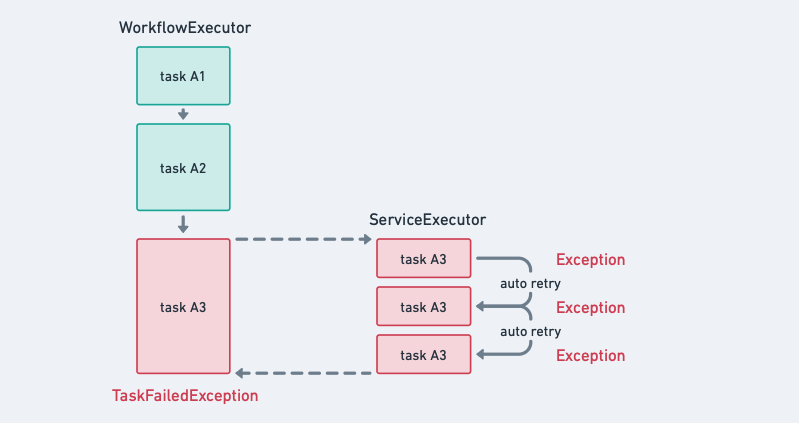
The TaskFailedException can also occur when waiting for the result of a task that was previously dispatched asynchronously:
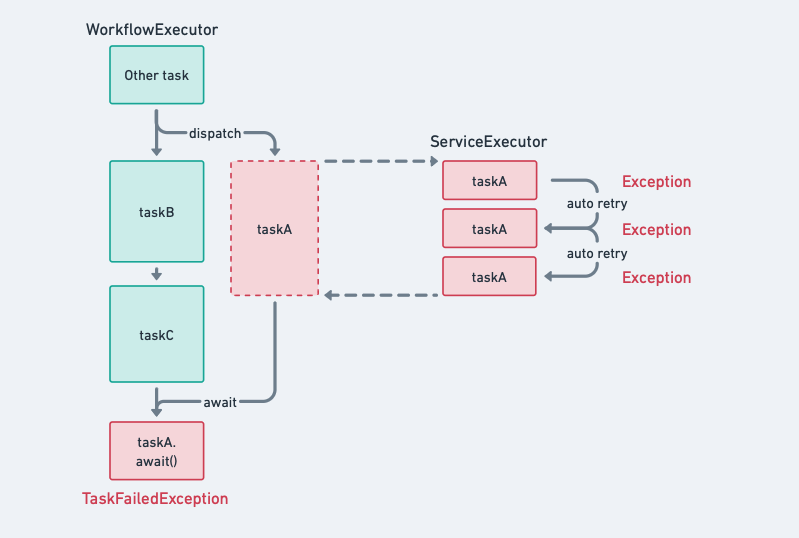
If a task fails when dispatched asynchronously, it will not cause an exception within the workflow unless the workflow attempts to access the task's result.
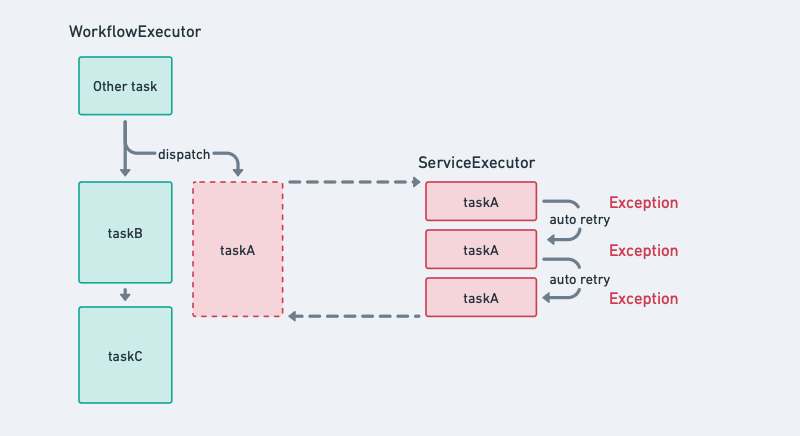
A TaskFailedException has detailed information about the failed task:
| Property | Type | Description |
|---|---|---|
serviceName | String | The name of the Service |
taskId | String | The ID of the failed task |
methodName | String | The name of the method called for the failed task |
lastFailure | TaskFailure | Details of the last failure |
The TaskFailure object describes each attempt to execute the task and has the following properties:
| Property | Type | Description |
|---|---|---|
workerName | String | The name of the worker where the exception occurred |
exception | GenericException | The details of the original exception |
stackTraceString | String | The string version of the original exception |
secondsBeforeRetry | double? | The duration in seconds before the next retry attempt - can be null if no retry |
retryIndex | Integer | The number of retry attempts made before the current attempt |
retrySequence | Integer | The number of times the task was manually retried |
The GenericException class is used to store the details of the original exception:
| Property | Type | Description |
|---|---|---|
name | String | The name of the original exception |
message | String | The message of the original exception |
cause | GenericException? | The cause of the original exception |
The GenericException class provides two methods for accessing custom properties of the original exception:
- the
getCustomProperties()method returns a map containing all custom properties of the original exception. - the
getCustomProperty(String name)method retrieves a specific custom property by its name, provided it was successfully serialized and deserialized.
When updating a Service Executor, be cautious about making changes to the name or type of custom properties associated with your exceptions. This could potentially disrupt running workflow instances that rely on these properties, as they might not be able to interpret messages containing the old name or type.
TaskTimedOutException
This exception is thrown when a workflow attempts to access the result of a timed-out task:
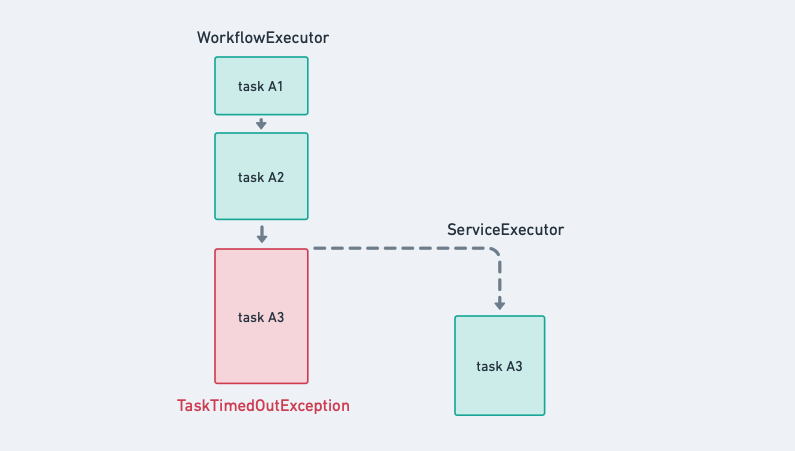
A TaskTimedOutException has the following properties:
| Property | Type | Description |
|---|---|---|
serviceName | String | The name of the Service |
taskId | String | The ID of the timed out task |
methodName | String | The name of the method called for the timed out task |
Errors Due to a (Child) Workflow Failure
WorkflowFailedException
This exception is thrown when a workflow or a client attempts to access the result of another workflow that failed due to the failure of a task or another workflow.
For instance, this exception throws in the parent workflow of a failing child workflow:
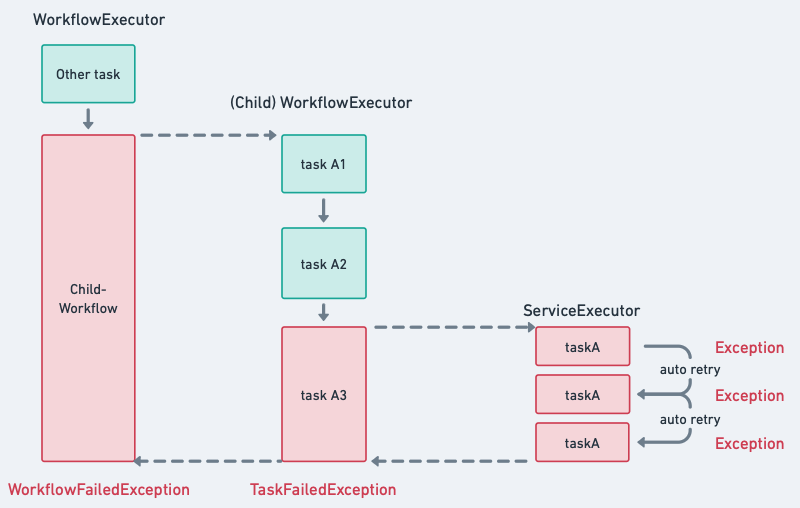
Or if a client waits synchronously for the result of another failing workflow:
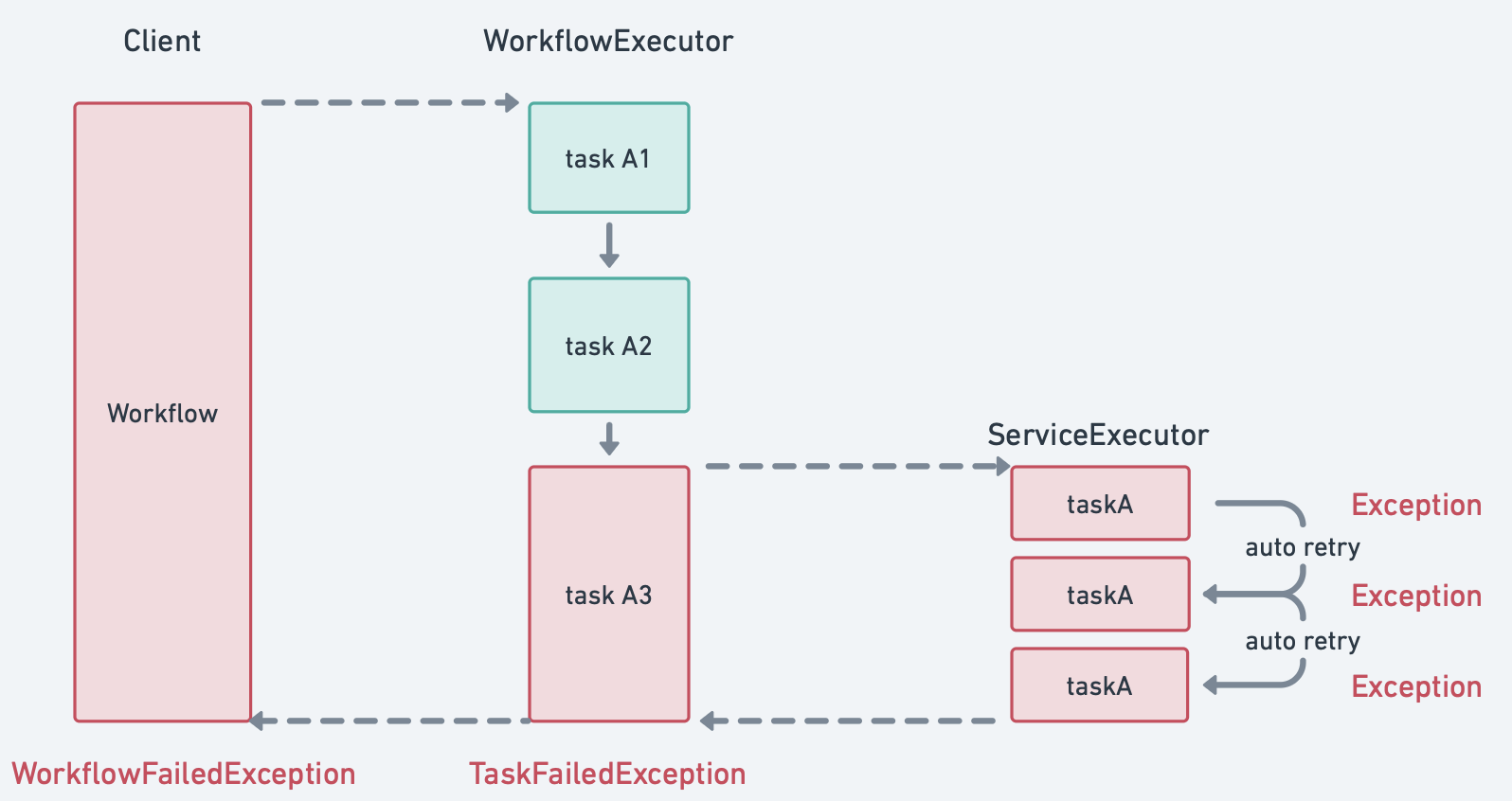
A WorkflowFailedException has the following properties:
| Property | Type | Description |
|---|---|---|
workflowName | String | The name of the other workflow that failed |
workflowId | String | The unique identifier of the failed other workflow |
workflowMethodName | String | The name of the method that was called on the failed other workflow |
workflowMethodId | String | The unique identifier of the execution of the method that failed |
deferredException | DeferredException | The original exception that caused the other workflow to fail |
WorkflowTimedOutException
This exception is thrown when a workflow or a client attempts to access the result of a child workflow that timed out. The timeout duration is specified in the interface of the Workflow:
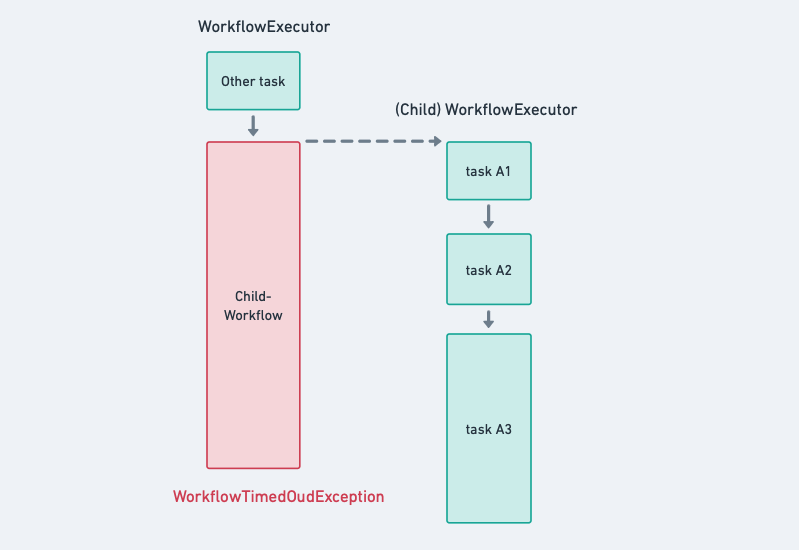
A WorkflowTimedOutException has the following properties:
| Property | Type | Description |
|---|---|---|
workflowName | String | The name of the child workflow that timed out |
workflowId | String | The unique identifier of the timed out workflow instance |
workflowMethodName | String? | The name of the method that was called on the timed out child workflow |
workflowMethodId | String? | The unique identifier of the execution of the method that timed out |
WorkflowCanceledException
This exception is thrown when a workflow or a client attempts to access the result of a child workflow that has been canceled.
A WorkflowCanceledException has the following properties:
| Property | Type | Description |
|---|---|---|
workflowName | String | The name of the child workflow that timed out |
workflowId | String | The unique identifier of the timed out workflow instance |
workflowMethodName | String? | The name of the method that was called on the timed out child workflow |
workflowMethodId | String? | The unique identifier of the execution of the method that timed out |
WorkflowUnknownException
This exception is thrown when a workflow or a client attempts to access the result of a child workflow that is unknown - this can happen when targeting a workflow by its ID.
A WorkflowCanceledException has the following properties:
| Property | Type | Description |
|---|---|---|
workflowName | String | The name of the child workflow that timed out |
workflowId | String | The unique identifier of the timed out workflow instance |
workflowMethodName | String? | The name of the method that was called on the timed out child workflow |
workflowMethodId | String? | The unique identifier of the execution of the method that timed out |
WorkflowExecutorException
This exception is thrown when a workflow or a client attempts to access the result of a workflow that failed due to an error in its own implementation.
A WorkflowExecutorException has the following properties:
| Property | Type | Description |
|---|---|---|
workflowName | String | The name of the child workflow that failed |
workflowId | String | The unique identifier of the failed workflow instance |
workflowTaskId | String | The ID of the failed workflow execution |
lastFailure | TaskFailure | Details of the last failure |
Try/catch in workflows
Use try/catch of DeferredException in workflows if you want to ensure that the workflow continues to run even if a task or another workflow failed:
String str;
try {
// synchronous call of HelloService::sayHello
str = helloService.sayHello(name);
} catch (TaskFailedException e) {
// react to the task failure
...
}
// synchronous call of HelloService::sayHello
val str = try {
helloService.sayHello(name)
} catch (e: TaskFailedException) {
// react to the task failure
...
}
Remember, for expected failures, it's a better practice to handle them within the Service and return a status object.
A DeferredException in a workflow cannot be resumed, as the workflow has already "moved on".
In workflows, do not catch any other exceptions then DeferredException. Specifically, actual exceptions thrown in Services or other workflows are wrapped within the DeferredException. It is not meaningful to try to catch these exceptions directly.
